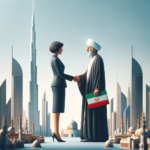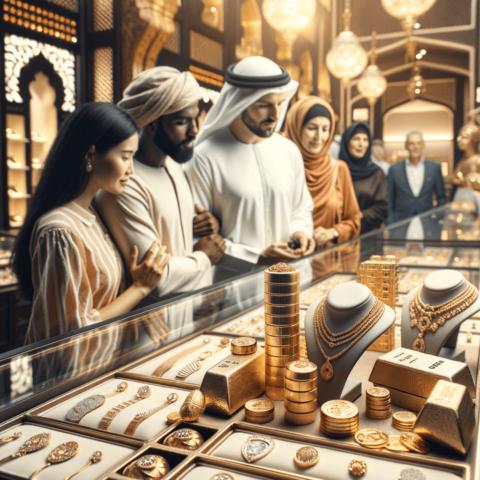
UAE Stands in Solidarity with Iran Amidst President’s Helicopter Crash
May 19, 2024
Glistening Opportunities: Dubai’s Bullion and Precious Metals Market in 2024
May 20, 2024Dubai’s gold market offers not just investment avenues but also an exquisite experience for tourists intrigued by luxury and business. This article delves into the latest trends and the vital role of Dubai in the global gold trade, providing insights beneficial for potential investors and tourists.
Gold Rates and Market Trends
Understanding the current gold rates in the UAE is a critical component for anyone interested in the allure of Dubai’s gold market. In particular, discerning the rates of 24K, 22K, 21K, and 18K gold can make a significant difference in investment strategies and purchasing decisions.
Currently, 24K gold represents the purest form of gold available and is priced at a premium. For example, as of the latest update, 24K gold is priced at AED 220 per gram, whereas 22K gold, which includes a small percentage of alloys, might be priced at AED 207 per gram. Although the differences seem marginal, for large investments or bulk purchases, these rates significantly impact the total expenditure.
Regularly tracking these rates is essential for investors who wish to optimize their purchase timing. Gold prices are highly volatile, influenced by various global economic factors such as currency fluctuations, geopolitical events, and market demand. For tourists, this knowledge enables them to budget effectively and seize opportunities when prices dip, making their luxury purchases even more rewarding.
Moreover, while 24K is preferred by purists, other karat categories like 22K, 21K, and 18K offer different value propositions. An 18K gold piece can be sturdier and more versatile for daily wear due to the higher alloy content, making it a favorite among fashion-conscious buyers.
In conclusion, keeping abreast of Dubai’s gold rates and market trends not only aids in making informed investment decisions but enriches the shopping experience for luxury seekers. By understanding these nuances, you position yourself to better navigate the glittering allure of Dubai’s gold market, ensuring every dirham spent is a step towards a glistening future.
Dubai’s Strategic Role in Global Gold Trade
Dubai’s strategic role in the global gold trade is unparalleled, positioning it as a crucial hub connecting East and West. The UAE’s effective policies and tax-free environment have buoyed its prominence, drawing attention from significant gold-importing markets like India, Switzerland, and the USA. India’s deep-seated cultural affinity for gold sees Dubai as a vital trading partner, with a substantial part of the UAE’s gold exports reaching the Indian subcontinent. Such a strong connection ensures a steady influx of gold, stabilizing prices and ensuring the availability of diverse quality grades in Dubai markets, right from 24K to 18K.
Switzerland’s role, characterized by its sophisticated refining industry, supplies Dubai with refined gold, contributing to the purity and quality assurance that tourists and investors seek. On the other hand, the USA’s luxury demand fuels Dubai’s market for exquisite designs and high-end jewelry segments, creating a niche appealing to affluent visitors.
These international relations significantly impact the local market, enhancing its attractiveness. Dubai’s reliance on these established markets ensures a constant supply of high-quality gold, minimizing volatility and infusing confidence among buyers. Investors eyeing Dubai appreciate the predictable market environment bolstered by these strategic connections. For tourists, these relationships translate into a diverse array of gold products at competitive rates, offering exceptional value for both luxury purchases and investment opportunities.
Thus, Dubai’s pivotal position in the global gold trade not only underpins its flourishing market but also influences the strategic decisions of its visitors, adding layers of reliability and allure that are hard to match elsewhere.
Local Demand and Supply Dynamics
Local demand for gold in Dubai is intricately linked to cultural norms and financial mechanisms, cementing its nickname as the “City of Gold.” **Consumer behavior** towards gold here is driven largely by a blend of tradition and investment motives. Jewelry purchases are notably prevalent, attributing to gold’s role in ceremonies and celebrations, from weddings to religious festivals. **Tourists** also contribute significantly, attracted by the diverse designs and competitive pricing in the gold souks and modern malls.
Financial institutions play a critical role, influencing market dynamics through liquidity provisions, storage solutions, and hedging strategies. These institutions enhance market stability, making it attractive for investors and traders. Banks and specialized financial firms provide loans with gold as collateral, ensuring liquidity for buyers, which magnifies the market’s volume and intensity.
Dubai’s dependency on global markets significantly impacts its supply chain. As a major **re-export hub**, Dubai imports gold from major suppliers like Switzerland, India, and various African nations, processing and re-exporting it. This import reliance makes the local market susceptible to **international price fluctuations** and geopolitical risks. Any disruption in global supply chains or political instability can lead to variations in the availability and pricing of gold products.
Nevertheless, Dubai’s efficient **logistics** and adaptable market structures typically mitigate these global influences, maintaining a steady flow of gold. Yet, consumers and investors must remain vigilant of these external risks, as they can impact not only the availability but also the value proposition of gold investments within the emirate.
Understanding the Purity of Gold
Understanding the Purity of Gold: Provide a detailed explanation of gold purity levels such as 24K, 22K, 21K, and 18K. Offer insight into how the karat system works and its importance for tourists and investors when choosing gold products in Dubai. Include a segment on the tradition of gold jewelry as a cultural symbol in the UAE.
In Dubai’s bustling gold market, understanding gold purity levels is paramount for both tourists and investors. Gold purity is measured in karats, with “K” standing for karat. Pure gold is 24 karats, equivalent to 100% purity. An item marked as 24K means it’s composed entirely of gold, making it the softest and most malleable. However, for practical reasons such as durability, gold is often alloyed with other metals, leading to lower karat ratings.
**22K gold**, for instance, comprises 91.67% gold and is notably popular in jewelry due to its balance of purity and strength. **21K gold**, common in many Middle Eastern regions, including the UAE, offers 87.5% purity, retaining high value while being slightly more robust. **18K gold** has 75% gold content, mixing with metals like silver or copper to enhance durability, making it ideal for elaborate designs and daily wear.
The karat system is crucial for tourists and investors as it directly impacts the value, appearance, and durability of the gold products. Investors might prefer higher karat gold for its higher intrinsic value, while tourists often lean towards 18K or 22K for jewelry with intricate craftsmanship suitable for daily use.
In the UAE, gold jewelry transcends mere adornment; it is a cultural symbol and a traditional part of celebrations, weddings, and dowries. The rich heritage of gold in Emirati culture underscores its significance and allure in markets like Dubai, making knowledge of gold purity essential for informed purchasing decisions. Understanding these nuances can significantly enhance the shopping experience and investment portfolio of those engaging with Dubai’s gleaming gold bazaars.
Future Trends and Investment Opportunities
The future of the gold market in Dubai holds promising potential and vast opportunities for both tourists and investors. Geopolitical shifts, economic fluctuations, and technological advancements in digital investments are set to shape new horizons. Dubai’s strategic geographical position and its stability amidst regional tensions make it a global hub for gold trading. As economic policies evolve, the emirate’s open market and low taxation will likely continue to attract international investors.
Digital investment is transforming the gold trade landscape, offering an array of modern investment tools. Blockchain technology and digital gold trading platforms provide more secure, transparent, and efficient ways to invest. For instance, tourists and investors can now purchase digital gold, even in fractional amounts, maintaining its value and liquidity without the need for physical storage.
Economic fluctuations have historically impacted gold prices; thus, understanding the global economic context is essential for making informed investment decisions. For instance, during times of economic instability, gold often serves as a safe haven asset, making it a beneficial addition to one’s portfolio.
To maximize gains, tourists and investors should stay updated on market trends and leverage technological tools for better insights. Enjoying Dubai’s gold market goes beyond just physical purchases; embracing digital investments can offer significant flexibility and potential returns, ensuring a well-rounded and profitable experience. By blending cultural appreciation with modern investment strategies, one can enjoy the best of Dubai’s glittering future.
Conclusions
Dubai remains a crucial node in the gold trade, presenting lucrative opportunities for investors and luxurious experiences for tourists. Whether looking for sound investments or exquisite jewelry, understanding the dynamics of Dubai’s gold market is essential for capitalizing on what this vibrant city offers.





